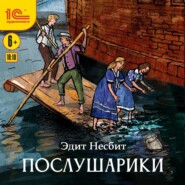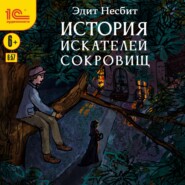По всем вопросам обращайтесь на: info@litportal.ru
(©) 2003-2024.
✖
In Homespun
Настройки чтения
Размер шрифта
Высота строк
Поля
Of course, I knew by that that he had been gossiping in the village.
'Well?' I said, for I saw that he had something more on his mind.
'I'm an old man,' he went on, 'but that need not stand in the way. Rather the contrary, for I shall be less trouble to you than a young husband. Will you marry me out of hand? And then when your aunt dies the china will be mine, and you will be well provided for.'
No one but a madman would have made such an offer, but that wasn't a reason for me to refuse it. I pretended to think a bit, but my mind was made up.
'And the bowl?' I said.
'Of course I'll lend you my bowl, and you shall give me the pieces of the old one. Lord Worsley's specimen has twenty-five rivets in it.'
'Well, sir,' I said, 'it seems to be a way out of it that might suit both of us. So, if you'll speak to mother, and if your circumstances is as you represent, I'll accept your offer, and I'll be your good lady.'
And then I went back to aunt and told her Wilkinses was out of sago, but they would have some in on Wednesday.
It was all right about the bowl. She never noticed the difference. I was married to the old gentleman, whose name was Fytche, the next week by special licence at St. Nicholas Cole Abbey, Queen Victoria Street, which is very near that beautiful glass and china shop where I had tried to match the bowl; and my aunt died three months later and left me everything. Sarah married in quite a poor way. That quinsy of hers cost her dear.
Mr. Fytche was very well off, and I should have liked living at his house well enough if it hadn't been for the china. The house was cram full of it, and he could think of nothing else. No more going out to dinner; no amusements; nothing as a girl like me had a right to look for. So one day I told him straight out I thought he had better give up collecting and sell aunt's things, and we would buy a nice little place in the country with the money.
'But, my dear,' he said, 'you can't sell your aunt's china. She left it stated expressly in her will.'
And he rubbed his hands and chuckled, for he thought he had got me there.
'No, but you can,' I said, 'the china is yours now. I know enough about law to know that; and you can sell it, and you shall.'
And so he did, whether it was law or not, for you can make a man do anything if you only give your mind to it and take your time and keep all on. It was called the great Fytche sale, and I made him pay the money he got for it into the bank; and when he died I bought a snug little farm with it, and married a young man that I had had in my eye long before I had heard of Mr. Fytche.
And we are very comfortably off, and not a bit of china in the house that's more than twenty years old, so that whatever's broke can be easy replaced.
As for his collection, which would have brought me in thousands of pounds, they say, I have to own he had the better of me there, for he left it by will to the South Kensington Museum.
BARRING THE WAY
I DON'T know how she could have done it. I couldn't have done it myself. At least, I don't think so. But being lame and small, and not noticeable anyhow, I had never any temptation, so I can't judge those that have.
Ellen was tall and a slight figure, and as pretty as a picture in her Sunday clothes, and prettier than any picture on a working day, with her sleeves rolled up to her shoulder and the colour in her face like a rose, and her brown, hair all twisted up rough anyhow; and, of course, she was much sought after and flattered. But I couldn't have done it myself, I think, even if I had been sought after twice as much and twice as handsome. No, I couldn't, not after the doctor had said that father's heart was weak, and any sudden shock might bring an end to him.
But, oh! poor dear, she was my sister—my own only sister—and it's not the time now to be hard on her, and she where she is.
She was walking regular with a steady young man, who worked through the week at Hastings, and come home here on a Sunday, and she would have married him and been as happy as a queen, I know; and all her looking in the glass, and dressing herself pretty, would have come to being proud of her babies and spending what bits she could get together in making them look smart; but it was not to be.
Young Barber, the grocer's son, who had a situation in London, he come down for his summer holiday, and then it was 'No, thank you kindly,' to poor Arthur Simmons, that had loved her faithful and true them two years, and she was all for walking with young Mr. Barber, besides running into the shop twenty times a day when no occasion was, just for a word across the counter.
And father wasn't the best pleased, but he was always a silent man, very pious, and not saying much as he sat at his bench, for he had been brought up to the shoemaking and was very respected among Pevensey folks. He would hum a hymn or two at his work sometimes, but he was never a man of words. When young Barber went back to London, Ellen, she began to lose her pretty looks. I had never thought much of young Barber. There was something common about him—not like the labouring men, but a kind of town commonness, which is twenty times worse to my thinking; and if I didn't like him before, you may guess I didn't waste much love on him when I see poor Ellen's looks.
Now, if I am to tell you this story at all, I must tell it very steady and quiet, and not run on about what I thought or what I felt, or I shan't never have the heart to go through it. The long and short of it was that a month hadn't passed over our heads after young Barber leaving, when one morning our Ellen wasn't there. And she left a note, nailed to father's bench, to say she had gone off with her true love, and father wasn't to mind, for she was going to be married.
Father, he didn't say a word, but he turned a dreadful white, and blue his lips were, and for one dreadful moment I thought that I had lost him too. But he come round presently. I ran across to the Three Swans to get a drop of brandy for him; and I looked at her letter again, and I looked at him, and we both see that neither of us believed that she was going to be married. There was something about the very way of the words as she had written them which showed they weren't true.
Father, he said nothing, only when next Sunday had come, and I had laid out his Sunday things and his hat, all brushed as usual, he says—
'Put 'em away, my girl. I don't believe in Sunday. How can I believe in all that, and my Ellen gone to shame?'
And, after that, Sundays was the same to him as weekdays, and the folks looked shy at us, and I think they thought that, what with Ellen's running away and father's working on Sundays, we was on the high-road to the pit of destruction.
And so the time went on, and it was Christmas. The bells was ringing for Christmas Eve, and I says to father: 'O father! come to church. Happen it's all true, and Ellen's an honest woman, after all.'
And he lifted his head and looked at me, and at that moment there come a soft little knock at the door. I knew who it was afore I had time to stir a foot to go across the kitchen and open the door to her. She blinked her eyes at the light as I opened the door to her. Oh, pale and thin her face was that used to be so rosy-red, and—
'May I come in?' she said, as if it wasn't her own home. And father, he looked at her like a man that sees nothing, and I was frightened what he might do, like the fool I was, that ought to have known better.
'I'm very tired,' says Ellen, leaning against the door-post; 'I have come from a very long way.'
And the next minute father makes two long steps to the door, and his arms is round her, and she a-hanging on his neck, and they two holding each other as if they would never let go. And so she come home, and I shut the door.
And in all that time father and me, we couldn't make too much of her, me being that thankful to the Lord that He had let our dear come back to us; and never a word did she say to me of him that had been her ruin. But one night when I asked her, silly-like, and hardly thinking what I was doing, some question about him, father down with his fist on the table, and says he—
'When you name that name, my girl, you light hell in me, and if ever I see his damned face again, God help him and me too.'
And so I held my stupid tongue, and sat sewing with Ellen long days, and it was a happy, sad time, if a time can be sad and happy both.
And it was about primrose-time that her time come, and we had kept it quiet, and nobody knew but us and Mrs. Jarvis, that lived in the cottage next to ours, and was Ellen's godmother, and loved her like her own daughter; and when the baby come, Ellen says, 'Is it a boy or a girl?' And we told her it was a boy.
Then, says she, 'Thank God for that! My baby won't live to know such shame as mine.'
And there wasn't one of us dared tell her that God meant no shame or pain or grief at all should come to her little baby, because it was dead. But by-and-by she would have it to lie by her, and we said No: it was asleep; and for all we said she guessed the truth somehow. And she began to cry, the tears running down her cheeks and wetting the linen about her, and she began to moan, 'I want my baby—oh, bring me my little baby that I have never seen yet. I want to say "good-bye" to it, for I shall never go where it is going.'
And father said, 'Bring her the child.'
I had dressed the poor little thing—a pretty boy, and would have been a fine man—in one of the gowns I had taken a pleasure in sewing for it to wear, and the little cap with the crimped border that had been Ellen's own when she was a baby and her mother's pride, and I brought it and put it in her arms, and it was clay-cold in my hands as I carried it. And she laid its head on her breast as well as she could for her weakness; and father, who was leaning over her, nigh mad with love and being so anxious about her, he says—
'Let Lucy take the poor little thing away, Ellen,' he says, 'for you must try to get well and strong for the sake of those that love you.'
Then she says, turning her eyes on him, shining like stars out of her pale face, and still holding her baby tight to her breast, 'I know what's the best thing I can do for them as love me, and I'm doing it fast. Kiss me, father, and kiss the baby too. Perhaps if I hold it tight we'll go out into the dark together, and God won't have the heart to part us.' And so she died.
And there was no one but me that touched her after she died, for all I am a cripple, and I laid her out, my pretty, with my own hands, and the baby in the hollow of her arm; and I put primroses all round them, and I took father to look at them when all was done, and we stood there, holding hands and looking at her lying there so sweet and peaceful, and looking so good too, whatever you may think, with all the trouble wiped off her face as if the Lord had washed it already in His heavenly light.
Now, Ellen was buried in the churchyard, and Parson, who was always a hard man, he would have her laid away to the north side, where no sun gets to for the trees and the church, and where few folks like to be buried. But father, he said, 'No; lay her beside her mother, in the bit of ground I bought twenty years ago, where I mean to lie myself, and Lucy too, when her time comes, so that if the talk of rising again is true we shall be all together at the last, as kinsfolk should.'
So they laid her there, and her name was cut under mother's on the headstone.
Father didn't grieve and take on as some men do, but he was quieter than he used to be, and didn't seem to have that heart in his work that he always had even after she had left us. It seemed as if the spring of him was broken, somehow. Not but what he was goodness itself to me then and always. But I wasn't his favourite child, nor could I have looked to be, me being what I am and she so sweet and pretty, and such a way with her.
And father went to church to the burying, but he wouldn't go to service. 'I think maybe there's a God, and if there is, I have that in my heart that's quite enough keeping in my own poor house, without my daring to take it into His.'
And so I gave up going too. I wouldn't seem to be judging father, not though I might be judged myself by all the village. But when I heard the church-bells ringing, ringing, it was like as if some one that loved me was calling to me and me not answering; and sometimes when all the folk was in church, I used to hobble up on my crutches to the gate and stand there and sometimes hear a bit of the singing come through the open door.
It was the end of August that Mr. Barber at the shop fell off a ladder leading to his wareroom, and was killed on the spot; and Mrs. Jarvis, she says to me, 'If that young Barber comes home, as I suppose he will, to take what's his by right in the eyes of the law, he might as well go and put his head into an oven on a baking-day, and get his worst friend to shove his legs in after him and shut the door to.'

















